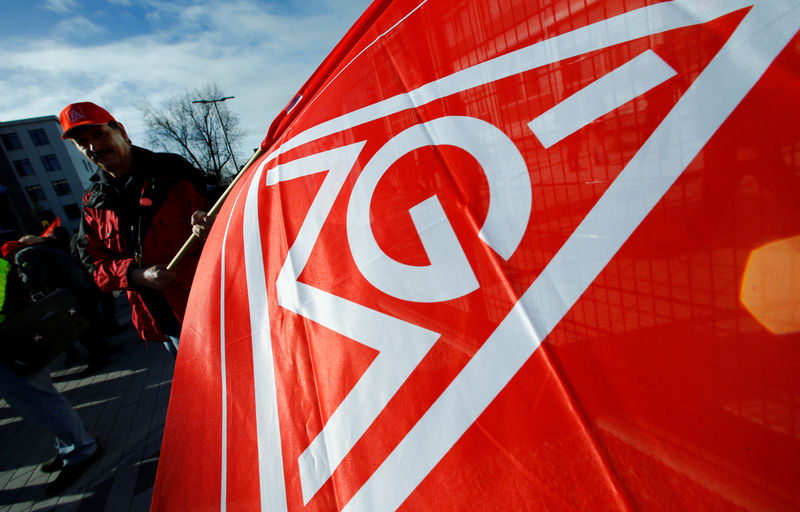By Edward Taylor and Ilona Wissenbach
STUTTGART, Germany (Reuters) - Powerful German union IG Metall will hold last-ditch talks with employers over higher wages and the right to shorter working hours for industrial workers, it said on Friday, holding off for now on its threat to call all-out strikes.
After discussions among IG Metall's leadership, the union has decided to make a final attempt to reach a deal over pay and working conditions, union chief Joerg Hofmann said at a press conference in Frankfurt on Friday.
If these fail to yield a result by lunchtime on Saturday, IG Metall will escalate the dispute with 24-hour strikes.
"The outcome of talks remains uncertain," Hofmann said, adding that differences of opinion over what constitutes a fair wage had widened during the previous four rounds of talks.
Regional wage talks in the southwestern state of Baden-Wuerttemberg, which is taking the lead in this year's national wage round, stalled late on Wednesday, raising the prospect of nationwide strikes.
But three people familiar with the talks told Reuters earlier on Friday that union and employer representatives would extend regional wage negotiations.
Talks will continue in Baden-Wuerttemberg, home to Mercedes-Benz maker Daimler (DE:DAIGn) and sports car brand Porsche (DE:VOWG_p) as well as auto suppliers Bosch and Mahle, from 1700 GMT.
Emboldened by the fastest economic growth in six years and record low unemployment, IG Metall is demanding a 6 percent pay rise for 3.9 million metals and engineering workers across Germany.
"Twenty-four hour strikes would indeed be painful," a spokesman for BMW (DE:BMWG) said, adding extended walkouts could disrupt production not only at the carmaker but also at suppliers.
Three hours of stoppages at BMW's Munich factory on Wednesday resulted in 250 cars not being assembled, BMW said, adding it was working to make up the production shortfall.
Premium rival Audi said it too was trying to catch up after around 700 vehicles were not assembled as a result of two stoppages at its Ingolstadt and Neckarsulm factories this week.
Daimler said it would similarly try to address any production shortfall as quickly as possible after any strikes.
"We assume we will be able to deliver all vehicles to our customers that they have ordered," a spokesman said.
A big sticking point in the talks is a union demand that workers should have the right to reduce their weekly hours to 28 from 35 to care for children, elderly or sick relatives, and return to full-time employment after two years.
This is IG Metall's first major push for shorter hours since workers staged seven weeks of strikes in 1984 to help push through a cut of the working week to 35 hours from 40 hours.
Employers have so far offered a pay rise of 2 percent plus a one-off 200-euro ($245) payment and have rejected demands for a shorter working week unless employers are allowed to increase hours temporarily as well.
More than 900,000 workers have taken part in industrial action this year in support of IG Metall's wage claims.
Germany's second biggest union, Verdi, which represents primarily services workers, is expected to publish its wage demand on Feb. 8.

Verdi and IG Metall together account for around 15 percent of the German workforce, and other sectors tend to broadly follow their agreements.